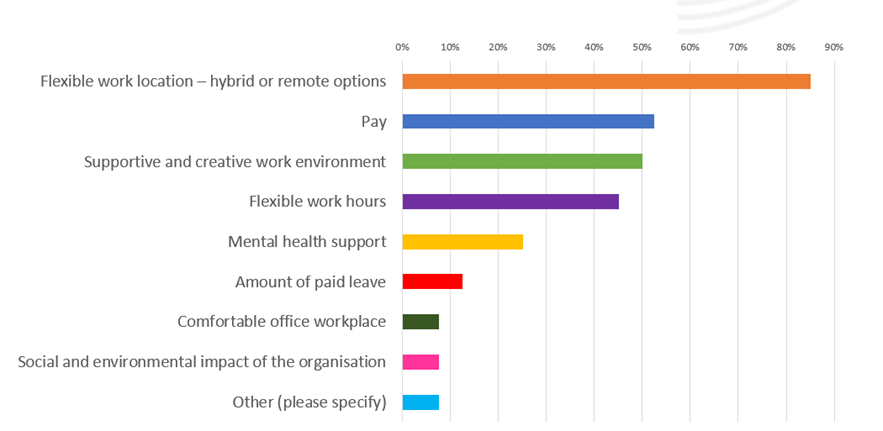Shifts in how we work have impacted the competencies graduates need to thrive, explains Christine D’Silva at business psychology consultancy Sten10.
Economic changes, technological developments, automation and globalisation are all driving significant shifts in the workplace. And the pandemic accelerated these disruptions further.
This means the way that organisations attract, hire and develop talent is also facing a number of era defining changes.
As we face new crises and challenges, we examine how these changes have impacted the competencies graduates need to thrive in the modern workplace.
How the workplace has changed
Remote and hybrid working
The shift to remote and hybrid working models was accelerated by the pandemic and looks to be here to stay. Just 1.7 million people worked from home prior to the pandemic. It is estimated that 20 million people relocated to home offices.
YouGov suggest that 50% of British workers still work from home at least some of the time, and 60% of those who don’t would like to. This change has had a great impact on the way we work and interact with each other at every level of organisations.
Read more about how employers have changed their working practices for onboarding and development.
Flexible working hours
We have seen a shift to flexible working hours, where the 9-5 is quickly becoming a relic of the past. This has had an impact on workplace behaviours, for example managers need to rethink the way they monitor and evaluate performance. They can no longer rely on in-office observations and hours worked. Managers need to place a greater level of trust in employees and focus more on evaluating meaningful work outputs.
Technology and automation
Video chat software such as Zoom, Teams and Slack are playing a critical role in enabling these shifts. Effective communication is critical. Communicating your point and telling your story in a concise and impactful way is more important than ever.
Artificial Intelligence and automation is advancing and playing an increasing role in our work. Those with a technological mindset, as well as an open and agile learning approach could find it easier to adapt to these changes.
Employee wellness and mental health
The global pandemic magnified the need for employee wellness initiatives. In the coming years, employees are more likely to prioritise self-care, and employers are more likely to invest in programmes that spotlight health and wellness. ISE’s Student Development survey reported the majority (70%) of employers had found the demand for mental health support had increased in 2022.
It will be important for employees to be more aware and manage their own health and wellness needs, and for managers to be sensitive and accommodating, leading in a more empathetic way.
Purpose and values
Since the pandemic people want to connect to a real sense of purpose in their role and they want organisations to demonstrate their commitment to social responsibility. There is much more pressure on organisations and their leaders to create a culture of community, engagement and to communicate a strong mission and purpose.
For example, Walgreens Boots Alliance CEO Roz Brewer announced a new company purpose, “More joyful lives through better health”. She and other leaders shared her personal commitment for how they would live that purpose publicly and encouraged other team members to do the same.
Diversity and inclusion
Companies have a lot to gain from continuing to make strides in this area and it will continue to impact positively on our behaviours at work in terms of how we listen and collaborate with each other, creating stronger solutions from our diversity in thought.
What do employees want?
We conducted a LinkedIn survey that received 44 responses from industry professionals. We asked: ‘Post-pandemic what are the top three issues that are most important to employees?’

The results revealed that a ‘flexible work location (with hybrid or remote working options)’, a ‘supportive and creative work environment’ and ‘flexible work hours’ were the most important factors to employees. Therefore the ability to work in a flexible and supported way is key.
‘Pay’ was the second most important factor which ranks higher than what we have seen in the past with similar surveys. This could reflect the current environment of rising inflation and costs.
We also asked survey participants about the competencies that are most important for graduates where remote and hybrid working models have become the norm. We discussed these findings with industry professionals at the Associate for Business Psychology.
Combining this research and our work with clients we have observed that whilst the underlying competencies remain the same, the nuance in behaviours and context have changed. In addition, some competencies have needed to be dialled up and others have become less important.
This highlights the need to ensure that the competency frameworks that organisations are using to attract, hire and develop talent reflect the behaviours needed for success in the modern workplace.
5 competencies graduates need to thrive in the modern workplace
1. Communication
Excellent communication skills are vital for graduates when working remotely. Ensuring the accuracy of messages and eliminating ambiguity are important skills to avoid miscommunication and build trusting relationships with others. This applies to both written and verbal communication.
The ability to articulate their message in a clear, concise and articulate way is more important than ever. This strength also includes the ability to determine the appropriate communication channel and technology to use, so catering to different styles of interacting.
Another skill is being able to judge the right frequency at which to connect, as well as being proactive and intentional about it.
2. Increasing levels of self-reliance and management
A heightened level of autonomy is needed in a remote work environment. Successful graduates are often described as those that are able to work with some level of independence, taking the initiative to ask for more work and challenges that stretch them, as well as asking for help when it is needed.
Those who are conscientious, disciplined and organised often demonstrate the ability to execute and show that they can be relied upon to deliver on their promises.
3. Learning to adapt and cope
Collins Dictionary named “permacrisis” the word of the year in 2022 after an extended period which has seen people live through crises including war, inflation, climate change and political instability.
Constant changes due to crises and technological advancements have meant that graduates today need to be able to adapt and cope. Individuals that have a flexible and adaptable approach may struggle less. Organisations need to support resilience in individuals through empathetic leadership and understanding.
4. Building self-awareness
It is important for graduates to be able to build their self-awareness and proactively drive their growth in a supported environment. The ability to ask for feedback, reflect and learn from experiences can accelerate growth.
Graduates today also need to be more aware of their own mental health and wellness, proactively monitoring and managing this, asking for help when it is needed and taking advantage of programmes that are offered by the organisation to support this.
5. Managing up and constructively sharing suggestions
The courage to speak up and constructively share opinions is encouraged and appreciated in many organisations today and this will continue to be important. Individuals that can make a positive impact by questioning the status quo where appropriate and bring a fresh perspective demonstrate the value they add.
It is important for managers and colleagues to create a psychologically safe environment for graduates to share their ideas and ask for what they need to do their job effectively.
In summary
Hybrid and remote working is on an upward trend, and businesses should build agile work structures to support this.
Graduates, who stand to miss out the most from in person interactions in the office environment, need to be supported. It is important to have a clear understanding of the behaviours that are needed for success to attract and hire the right individuals for your organisation, as well as training and developing individuals to help them thrive in the modern workplace.
You may be interested in also reading
Is the communications skills gap increasing?


0 Comments
Trackbacks/Pingbacks